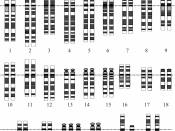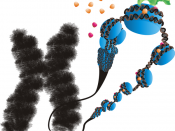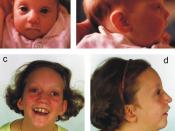There are many different disabilities that affect a number of children each year. Some conditions impair the body and some impair the brain. No matter what the disability, an affected child is at a disadvantage from the start. They are not considered to be "normal" and they will probably have difficulty fitting into society. Although they may be able to overcome their disability and live a happy and healthy life, they probably will not be able to do this without a struggle. Down syndrome is a condition that affects children from birth and stay with them throughout their entire lives. It is a disability that affects both the body and the mind. Down syndrome affects each individual in different ways. Some children struggle with the condition while others blossom and make great strides throughout their lives. All children with Down syndrome have the potential to contribute to society as much as anyone else.
Down syndrome is a condition associated with the mental retardation that results from a chromosomal abnormality. There are three types of chromosome abnormalities associated with Down syndrome. The first is trisomy 21. This is the result of an extra 21 chromosome. Instead of the normal 46 chromosomes, the individual with Down syndrome has 47 chromosomes in each cell (Selikowitz). Trisomy 21 is the cause of the majority of cases of Down syndrome (Pueschel, 1992).
The second type of abnormality is called translocation. This happens when the extra 21 chromosome attaches itself to another chromosome. The chromosomes affected in this case are usually 14, 21, or 22 (Pueschel, 1992). Translocation occurs when one of the parents is a carrier of translocation. This type of chromosome error is found in about 4 percent of individuals with Down syndrome (Selikowitz).
The third and least common chromosome deficiency is called...



Muah
Well-written paper.. must have been SOO boring to write tho..lol
1 out of 1 people found this comment useful.